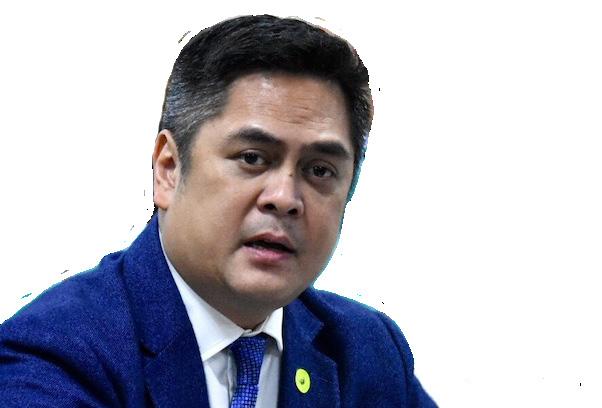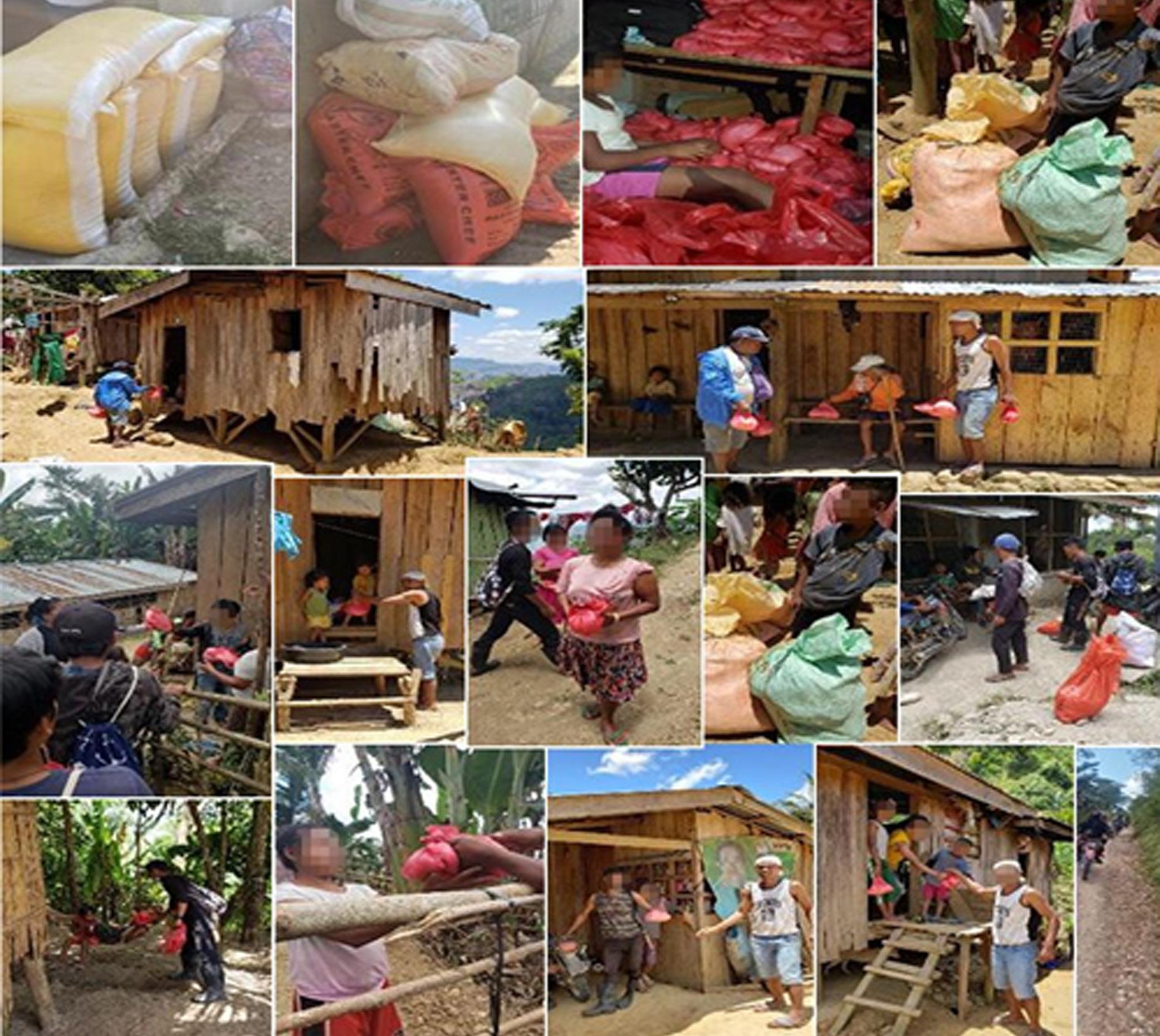
15 minute read
Sector-specific plans, sharing of practices boost Covid-19 fight
Sector-specific plans, sharing of practices boost Covid-19 fight COVID -19 News
MANILA – The member agencies of the Inter-agency Task Force (IATF) for the Management of Emerging Infectious Diseases are formulating sector-specific plans, strategies, and targets to intensify the country’s response to the coronavirus disease (Civid-19) crisis, a ranking official said.
Advertisement
By Lade Jean Kabagani

National Task Force (NTF) Covid-19 chief implementer and Presidential Adviser on the Peace Process Secretary Carlito Galvez Jr. (PNA)
National Task Force (NTF) Covid-19 chief implementer Secretary Carlito Galvez Jr., also the presidential peace adviser, said local government units (LGUs) were given a directive to facilitate regional and provincial cooperation to better contain the spread of Covid-19. the Covid-19 health event.” “With this new directive, LGUs can exchange ideas, plans, and strategies on effective ways to prevent the spread of the Covid-19, or it could be by sharing LGUs’ best practices,” he said in a virtual press briefing on Tuesday.
Under IATF Resolution No. 25, he said, new guidelines for the implementation of quarantine measures will “adopt a national-government-enabled, LGUled, and people-centered response to Galvez said the resolution stated that the Department of Health (DOH) and the Department of the Interior and Local Government (DILG) are tasked to enter a data-sharing agreement (DSA)
“The DILG along with the LGUs will lead the conduct of the contacttracing in the communities,” he said, noting that the LGUs have the capacity “to identify possible Covid-19 clusters” in their areas.
He said LGU’s health resiliency is crucial to strengthening the fight against the dreaded virus.
“As we’ve said before, the localization of the implementation of the National Action Plan against Covid-19 at the regional, provincial, municipal, city and barangay levels is the key to beat Covid-19,” he added.
Effective quarantine measures
Meanwhile, Galvez cited the research conducted by the University of the Philippines Research Institute (UPRI), citing the implementation of the enhanced community quarantine (ECQ) in helping curb the spread of the contagion.
“According to UP Professor Mahar Lagmay in an interview, there is a possibility that NCR (National Capital Region) may reach the socalled ‘peak’ if we will base it on the rate or the number of new infections,” he said, saying the same thing might happen to those provinces, cities, and municipalities under community quarantine. Dr. Ted Herbosa, UP Executive Vice President and National Task Force on Covid-19 Medical Adviser, have also warned that the “rate of new infection” may climb by shortly lifting the ECQ.
“It also suggested that any decision made by the government should be in accordance with a “science-based model,” he cited.
Testing kits, facilities, PPE
Galvez said suspected Covid-19 cases, health workers and those most vulnerable members of society including the elderly, pregnant women and immuno-compromised individuals were prioritized in the “localized and targeted testing” nationwide, which already started on April 14.

The “targeted massive testing”, he said, has provided the task force a holistic assessment of the public health situation in the country.
On the other hand, Galvez said the Covid-19 testing laboratory of the Philippine National Red Cross (PRC) is now operational and could accommodate more or less 12,000 tests per day.
The government, he said, targets more or less 2 million individuals to be tested.
“This plan will provide the government the critical data and analysis to help address the crisis brought about by Covid-19,” he added.
Galvez said 52,837 individuals have already been tested as of this posting.
He said the first batch out of the 900,000 PCR (polymerase chain reaction) testing kits and 2 million rapid testing kits being procured are expected to arrive this week.
There are 3,052 quarantine facilities that have already been established nationwide, he said, which can cater to about 211,474 suspected and mild Covid-19 patients.
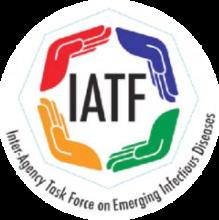
He said the Philippine Health Insurance Corporation (PhilHealth) will provide health packages for Covid-19 patients who had been confirmed positive and admitted not later than April 15.

Galvez added that several medical supports, including personal protective equipment (PPE) sets for health workers, are regularly transported and distributed to all private and public hospitals nationwide, to ensure their safety from the risks of the dreaded virus.
Philippine Air Force (PAF) personnel, he said, are tasked to transport the protective gear embarking a C-130 plane, which will depart twice a day.
He said this would double the hauling capacity of PPE suits (so) that the medical workers will be ensured of the “stockpiling and strategic reserve” of protective gear. Health crisis response
Galvez assured that the Department of Agriculture (DA) and the Department of Trade and Industry (DTI) are continuously monitoring the stable prices of commodities, including enough supplies of agricultural products and other essential food items.
Policies on suggested retail price (SRP) and price freeze are imposed nationwide, Galvez said.
He said the government continues to strengthen the quarantine measures along with the national action plan.
The implementation of the “locate, test, isolate, cure strategy” will curb down the numbers of new Covid-19 cases and deaths in the country. (PNA) APRIL 18-24, 2020 | 49
PhilHealth maximizing resources amid rising Covid-19 cases: Go COVID -19 News
By Jose Cielito Reganit
MANILA – Senator Christopher Lawrence “Bong” Go said the new case rates of the Philippine Health Insurance Corporation (PhilHealth) for coronavirus disease (Covid-19) patients is aimed at maximizing the agency’s available funds in view of the rising cases of the dreaded disease in the country.


Senator Christopher Lawrence “Bong” Go
“Ginagawa ng PhilHealth ang lahat upang ma-maximize ang resources nila (PhilHealth is doing everything to maximize its resources) in order to continue assisting patients affected by Covid-19 pay for their hospital bills,” Go said in a recent radio interview. In coming up with the case rates, the chair of the Senate Committee on Health and Demography explained that PhilHealth has to exercise prudence in anticipation of a spike in Covid-19 cases following the start of mass testing. As of Tuesday, the Department of Health (DOH) reported that Covid-19
has so far infected 6,599 people in the Philippines, with 437 deaths and 654 recoveries.
“So ngayon po, naglabas na ng package naka-depende sa (So now, they released packages depending on the) severity of pneumonia,” Go said.
Previously, all Filipinos confined for Covid-19 had full PhilHealth coverage until April 15, when PhilHealth began implementing the new case rates.
For patients with mild pneumonia, PHilHealth will cover PHP43,997; for moderate pneumonia, PHP143,267; for severe pneumonia, PHP333,519; and, for critical pneumonia, PHP786,384 .
These packages cover the rates for accommodations; management and monitoring of illness; laboratory, diagnostics and imaging; medicines included in the guidelines and protocol of the DOH; and supplies and equipment, including personal protective equipment (PPE).

If the patient still does not have the capacity to pay for the hospital bill in excess of the amount already shouldered by PhilHealth, Go said the patient could request for more assistance from PhilHealth subject to its evaluation.
He also said patients may also seek additional assistance from the 71 existing Malasakit Centers all over the country. Center dun sa ospital kung saan sila naadmit, pwede sila humingi ng tulong dahil nandyan ang apat na ahensya ng gobyerno para tumulong (If ever there is a Malasakit Center in the hospital where they are admitted, they can ask for assistance as there are four government agencies there to help them),” Go said.
COVID -19 News
A Malasakit Center is a onestop-shop for indigent and financially incapacitated patients where relevant government agencies with medical and financial assistance programs are gathered under one roof.
The agencies in Malasakit Centers include PhilHealth, Department of Health DOH), Department of Social Welfare and Development (DSWD), and Philippine Charity Sweepstakes Office (PCSO).
Go assured that despite the enhanced community quarantine (ECQ), Malasakit Centers remain functional and responsive in assisting those who need medical and financial assistance from the government, especially poor and indigent patients.
He also assured that his office is always open for patients who need assistance.
“Kung may problema pa at kung saka-sakali po makakatulong kami, ang opisina ko po, huwag po kayong mag-atubiling lumapit (If there are still problems and my office, can be of help, please don’t hesitate to approach us),” Go said. (PNA)
anti-discrimination zone By Azer Parrocha
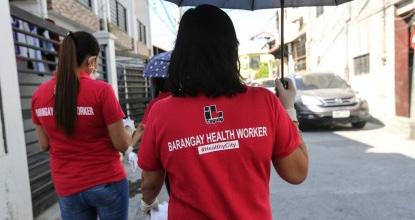

MANILA – Threats, discrimination, or harm against front-liners, health workers, and patients suspected of having coronavirus disease 2019 (Covid-19) are now prohibited in all 17 cities and municipalities in Metro Manila, the Inter-Agency Task Force on Emerging Infectious Diseases (IATF-EID) said on Monday.
Cabinet Secretary and IATF Spokesperson Karlo Nograles bared that all local government units (LGUs) in Metro Manila now have an antidiscrimination ordinance or executive order in place that penalizes all violators. “I am happy to report that according to the DILG (Department of the Interior and Local Government), all LGUs in Metro Manila now have an anti-discrimination ordinance or EO in place,” he said in a virtual presser on Monday. Nograles urged the public to report threat, discrimination, or harm against front-liners, health workers, and patients to the National Bureau of Investigation (NBI) through the following hotline numbers: 09664723056 (Globe); 09617349450 (Smart); 09751539146 (regional number); (02) 852 40237 (landline). | APRIL 18-24, 2020 52
Discriminatory acts include “coercion, libel, slander, physical injuries, and the dishonor of contractual obligations, such as contracts of lease or employment”, Nograles said. He also encouraged health workers to seek assistance from the police in reaching their destination since mass transport is suspended under the quarantine measures.
COVID -19 News
Violators will be slapped with criminal, civil, and administrative charges, he added. Nograles, meanwhile, emphasized the importance of front-liners and health workers in providing service as the world grapples with the Covid-19 health crisis. No more window hours Meanwhile, Nograles also welcomed the DILG’s memorandum to discontinue the use of limited window periods with regard to access to public and private establishments like wet markets, supermarkets, grocery stores, and pharmacies.
“Tuloy-tuloy pong gumagalaw ang mga sangay ng gobyerno upang tugunan ang pangangailangan ng taumbayan. Maraming salamat po sa mga LGU na kasangga ng gobyerno sa laban na ito, at maraming salamat uli sa ating mga health worker at frontliner na walang tigil na nagtatrabaho at nagsasakripisyo para sa ating lahat (The government agencies continue to attend to the needs of the public. Thank you to the LGUs who are partners of the government in this fight, and many thanks to health workers and front-liners who have been working non-stop and sacrificing so much for all of us),” he said.

On April 13, President Rodrigo Duterte ordered the Philippine National Police to arrest persons committing discriminatory acts against health workers on the front line against Covid-19. Quoting the DILG, Nograles said “the imposition of such restrictions further creates congestion of people who flock to these establishments at the same time, and poses risks to the implementation of social distancing. Scheduling and/or clustering of the communities and/or barangays who may be allowed to go out instead is highly encouraged”.
The DILG decided to discontinue the imposition of “narrow or limited time period” on the access of public and private establishments to prevent people from flocking and congesting facilities.
The whole of Luzon is currently under enhanced community quarantine until April 30 to further reduce the transmission of Covid-19.
As of April 19, there are a total of 6,250 confirmed Covid-19 cases in the country, 409 deaths, and 572 recoveries. (PNA)
IATF releases revised guidelines on expanded testing for Covid-19 COVID -19 News
By Azer Parrocha
MANILA – The InterAgency Task Force for the Management of Emerging Infectious Diseases (IATFEID) has revised its guidelines on the expanded testing for coronavirus disease (Covid-19) as the country moves closer to the end of the Luzon-wide enhanced community quarantine on April 30.
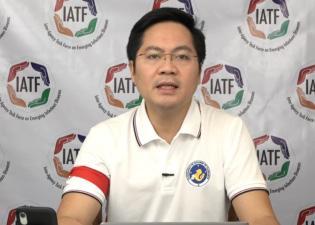

Cabinet Secretary and IATF spokesperson Karlo Nograles
In a virtual presser on Monday, Cabinet Secretary and IATF spokesperson Karlo Nograles said the expanded testing will only be conducted on individuals who are “at-risk of contracting Covid-19 infection.” Indiscriminate testing beyond close contacts of a confirmed Covid-19 case is not recommended, he added. He also listed subgroups of at-risk individuals arranged in order of greatest to lowest need for testing.
He said those required to undergo testing are “suspect cases, individuals with relevant history of travel and exposure or contact -- whether symptomatic or asymptomatic -- and health workers with possible exposure, whether symptomatic or asymptomatic.” Those who will be prioritized are patients or health workers with severe or critical symptoms, have history of travel or contact with a confirmed Covid-19 case (subgroup A), followed by patients or health workers with mild symptoms, have history of travel or contact with a confirmed Covid-19 case, and are
Next in line are patients or health workers with mild symptoms, have history of travel or contact to a confirmed Covid-19 case (subgroup C), and patients or health workers who are asymptomatic but have a history of travel or contact to a confirmed Covid-19 case (subgroup D).
Nograles said due to global shortage of testing kits and limitation in local capacity for testing, the government will rationalize available tests and prioritize subgroups A and B.
However, in view of the expansion of testing capacity and to ensure health workforce safety, subgroup C will be tested and health workers prioritized.

The IATF has directed all subnational laboratories to allocate between 20 to 30 percent of their daily testing capacity for health workers and the remaining 70 to 80 percent for patients, he added.
Type of test kits
Nograles said the real-time polymerase chain reaction (RT-PCR) test approved by the Food and Drug Administration (FDA) and validated by the Research Institute for Tropical Medicine (RITM) is the confirmatory test for Covid-19.
He said rapid antibody-based test kits should not be used as standalone tests to definitively diagnose or rule out Covid-19. “Because these (rapid antibodytest kits) must be used in conjunction with RT-PCR, care must be exercised to not unduly consume RT-PCR test kits for the sake of confirmation,” he said.
COVID -19 News
He also emphasized that reporting of confirmed and recovered cases will continue to be based on RT-PCR testing, in accordance with Administrative Order 2020-0013.
“Only rapid antibody-based test kits approved by the FDA and locallyvalidated by the RITM or the Department of Science and Technology may be used,” he said. Nograles also reminded that disposal of test kits, including personal protective equipment (PPEs) and other materials used in testing, should adhere to existing guidelines on the management of healthcare wastes. He said the expanded use of point-of-care rapid antibody-based test kits through validation and seroepidemiological studies will be explored for subgroup D, as testing all asymptomatic contacts of confirmed cases using RT-PCR is not recommended until there is surplus testing capacity.
“Results of such validation and sero-epidemiological studies shall be submitted to DOH (Department of Health) and to the Health Technology Assessment Council (HTAC) for their review and consideration. This should inform future prospects of financing of DOH and PhilHealth since both agencies may only finance or reimburse Covid-19 test kits that have been positively recommended by the
HTAC as required by RA No. 11223,” Nograles said, referring to the Universal Healthcare Act.
COVID -19 News
validation study for asymptomatic contacts provided (Annex C), and report testing results.
Once the FDA-approved antibody-based test kits have been validated by RITM and other designated institutions, Nograles also said only licensed medical doctors may request and administer antibody-based tests.
Returning overseas workers
Nograles said all returning Overseas Filipinos (OFs) which have communitybased Covid-19 transmission have to undergo mandatory 14-day quarantine. OFWs could also be tested using rapid anti-body tests after they enter quarantine facilities and undergo 14- day quarantine.
He said expanded testing in areas with suspected Covid-19 communitybased transmission can be performed at the household, purok, and barangay level with a proper sampling methodology in collaboration with the Epidemiology Bureau and local health officials.
Only properly validated antibody testing kits will be allowed to be used, he added.
Pending availability of plaque reduction neutralization test (PRNT) validation by RITM, Nograles said all who intend to conduct their own validation studies are requested to register their studies through covid19rdt@gmail.com (including update on status of ethics approval), use the protocol for local He also reminded that testing of asymptomatic people should be performed with proper safety precautions, including hand hygiene, use of appropriate PPE for conducting the test, respiratory hygiene, waste disposal, and patient care equipment. All symptomatic patients should be referred for RT-PCR testing and isolated accordingly.
Last Friday, National Task Force (NTF) Covid-19 chief implementer Secretary Carlito Galvez Jr., also presidential peace adviser, said the government is preparing for the procurement of 900,000 RT-PCR test kits and 2 million rapid testing kits.

The government, he said, will purchase the testing kits along with other medical equipment and supplies to capacitate accredited national and sub-national testing laboratories in the country.
The additional PCR and rapid testing kits cost roughly PHP3.2 billion and will be purchased by the procurement service of the Department of Budget and Management.
As of April 19, there are a total of 6,250 confirmed Covid-19 cases in the country, 409 deaths, and 572 recoveries. President Rodrigo Duterte is expected to decide on whether to extend or modify the ECQ within the week, according to the Malacañang. (PNA)


